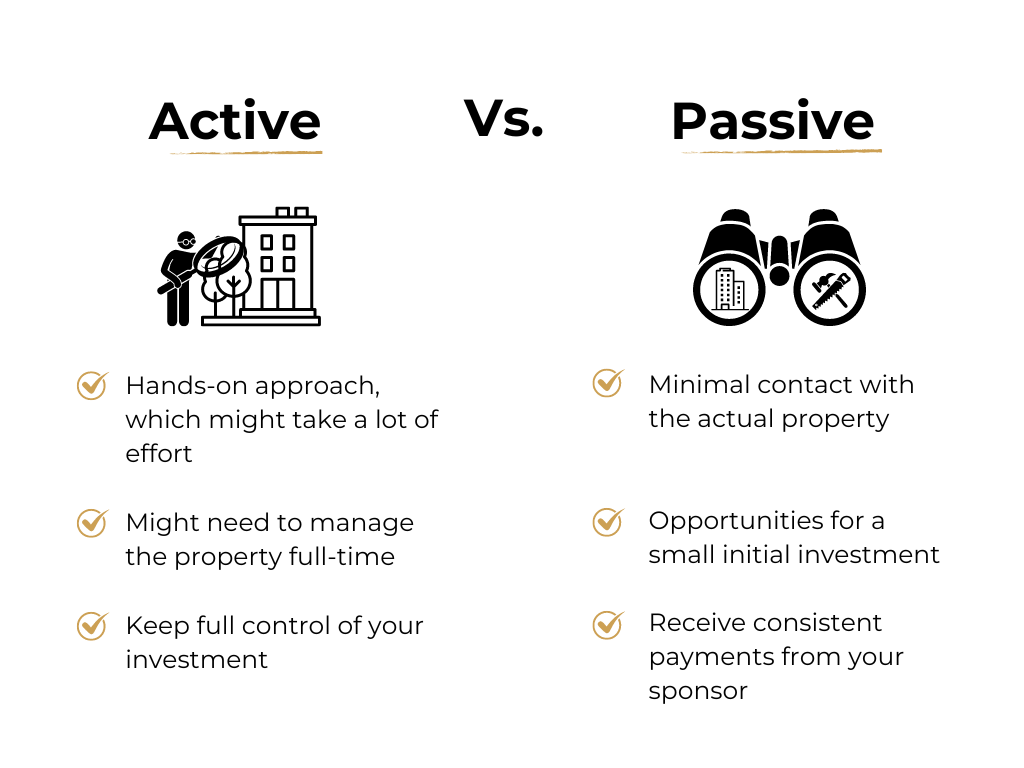FAQs: Passive Real Estate Investing
|
MARCH 11, 2024
|
What’s Passive Real Estate Investing?
Passive real estate investing means putting your money into property-related investments without being actively involved in managing those properties. Essentially, you’re investing in real estate to earn returns, but you’re not dealing with everyday tasks like maintenance, tenant issues, or other operational responsibilities.
What’s the difference between active and passive real estate investing?

Active real estate investing usually involves a hands-on approach where the investor takes on the role of a landlord or property manager, which can be quite labor-intensive. This might include finding and managing tenants, maintaining the property, and handling all the day-to-day operations.
On the other hand, passive real estate investing means the investor has little to no involvement in the management of the property. They might invest in a real estate fund or a real estate investment trust (REIT), where they simply contribute capital and collect earnings from the investment, which are typically managed by a third party or a sponsor. This approach often requires a lower initial investment and allows investors to collect regular payouts without dealing with the complexities of direct property management.
Does direct property ownership offer a better return than passive real estate investing?
There’s no universal answer to this. Owning property directly can cut out extra costs and third-party involvement, potentially leading to higher profits, especially for those with the know-how to manage properties well. Yet, not everyone has the resources, time, or expertise for direct management. On the other hand, passive investing options such as REITs and real estate crowdfunding generally demand a smaller initial investment than outright property purchase and offer a broader variety of investment opportunities.
How does investing passively in real estate compare to stock market investments?

Passive investing in both real estate and stocks is accessible thanks to fintech advancements, allowing investors to effortlessly diversify their portfolios with various assets. This progress has empowered individual investors to diversify their holdings, incorporating stocks, bonds, real estate, and other asset classes, without the need for hands-on management. The returns from passive real estate investments can vary in comparison to those from the stock market, influenced by the investment’s duration and many other variables. However, real estate often holds the edge in offering more favorable tax benefits. Diversification remains essential, positioning passive real estate as a strategic part of a comprehensive investment portfolio.
Does passive real estate investing provide the same tax advantages as direct property ownership?
The tax benefits for passive real estate investors, particularly those who are limited partners (LPs), might be comparable to the “pass-through” advantages seen with direct property ownership, depending on the investment’s setup. Nevertheless, the tax implications of real estate investments can vary widely based on numerous variables, so it’s essential to seek advice from a tax expert.
What’s important to understand before passive real estate investing?
Before investing, it’s crucial to analyze market movements, types of properties, geographical areas, and the history of both platforms and sponsors involved. Conducting thorough due diligence helps grasp the associated risks and possible gains of each investment.
Explore Opportunities with Faris Capital Partners. Click here to arrange a discussion with our Investor Relations team and learn more.
Are you curious about what sets Faris Capital Partners apart? Download our information booklet to explore how we make it all possible and create value for our partners. Click here to access the booklet!
Ready to connect?
Book a call with our investor relations team today to learn more about current investment opportunities.
Have a question?
Please use the form below to contact us. We will never spam you, or sell your email to third parties.



